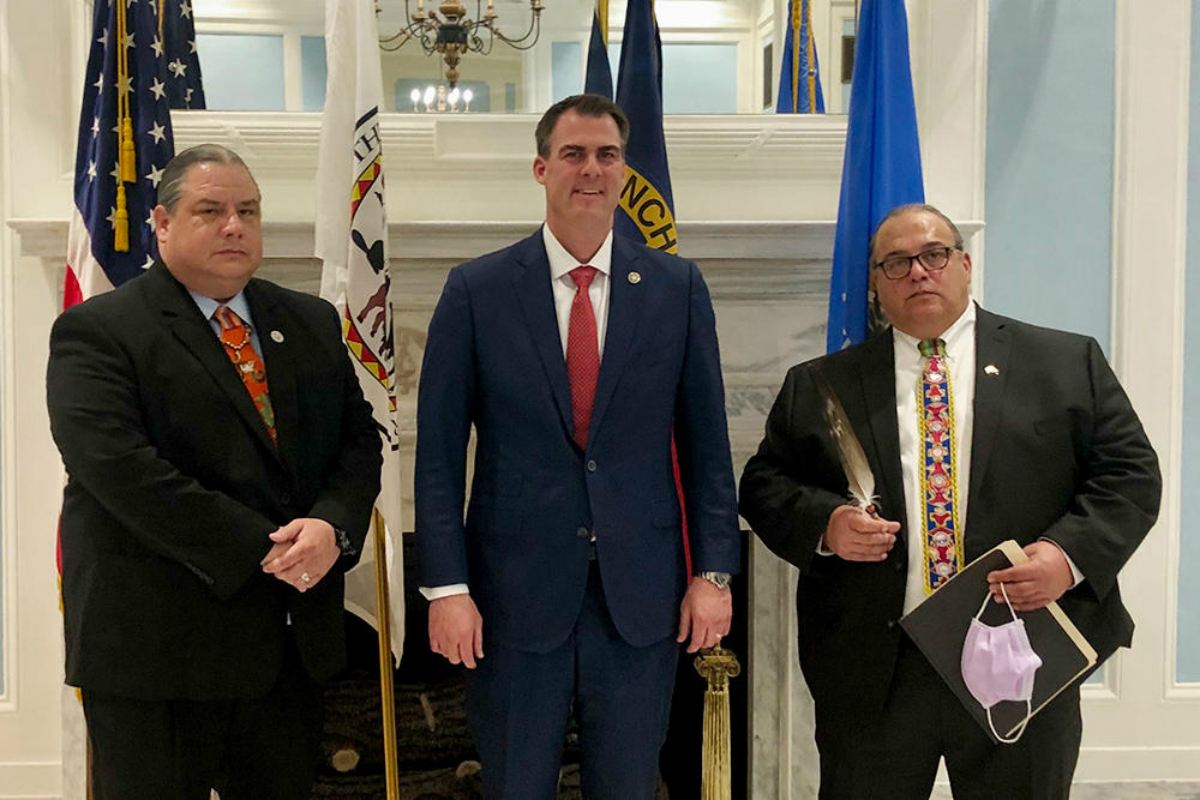Oklahoma Tribes Write Interior Department Regarding Their New Gaming Compacts, Dismiss Sister Tribes’ Complaints
Posted on: May 22, 2020, 10:34h.
Last updated on: May 22, 2020, 11:42h.
The two Oklahoma tribes that reached new gaming compacts last month with Governor Kevin Stitt (R) tell the US Interior Department that their casino revenue-sharing arrangements should be formally approved.

In April, the Comanche Nation and Otoe-Missouria Tribe announced new gaming compacts with the state. The 15-year contracts require the tribes to share with the state between 4.5 percent to six percent of their gross gaming revenue (GGR) from both slot machines and table games. If they build new casinos, the percentage jumps to 13 percent.
The deal also allows the two tribes to operate sports betting in exchange for sharing 1.1 percent of the amount wagered (handle).
Stitt remains at odds with the 33 other federally recognized tribes that operate Class III gaming (slots and tables) in Oklahoma. The first-term Republican governor contends that their initial 15-year gaming compacts reached in 2005 expired January 1, 2020.
Stitt wants more money from Indian casinos. More than a dozen tribes, however, claim their gaming compacts automatically rolled over into new 15-year terms, and the governor is fighting an unjust battle.
Tribes vs. Tribes
The Chickasaw Nation, Quapaw Nation, and Wichita & Affiliated Tribes recently wrote the US Department of the Interior (DOI) asking for the federal government agency and its Bureau of Indian Affairs to reject the Comanche and Otoe-Missouria updated gaming compacts. The Interior Department has until June 8 to make a decision.
Opponents to the gaming compacts argue that Stitt has no legal authority to authorize sports betting, and by forgoing a universal tribal casino revenue-sharing arrangement for all tribes demonstrates “a profound disrespect for Tribes and Tribal sovereignty,” claims Chickasaw Nation Senior Counsel Stephen Greetham.
William Nelson, Comanche chairman, and John Shotton, Otoe-Missouri chairman, say such suggestions are invalid and have no legal grounds.
The complaints from our fellow tribes have no legitimate legal basis, as the compacts are legal, were negotiated in good faith, and should be approved,” said Shotton. “These compacts are the product of the most fundamental aspects of tribal sovereignty.”
“Our compact is legal and we look forward to approval from the Department of the Interior,” added Nelson.
Lawsuit Ongoing
On the day Stitt claimed the state’s gaming compacts with the tribes expired, a lawsuit was brought against the governor by the Cherokee, Chickasaw, and Choctaw nations. The suit was later joined by 10 other Oklahoman tribes.
The lawsuit contends that Stitt is wrong is demanding new contracts. Tribes presently share four to six percent of their slot win with the state, dependent on total revenue, and 10 percent of their table game income.
The larger tribes believe Stitt’s deal with the Comanche and Otoe-Missouria to allow them to actually share fewer gaming dollars moving forward is a tactic to cause division among the Native Americans. The Cherokee, Chickasaw, and Choctaw nations are responsible for the majority of casino payments to the state, and Stitt is calling on them to share upwards of 25 percent.
A federal judge has ordered the state and tribes to resolve the lawsuit in mediation by May 31.
Related News Articles
Most Popular
LOST VEGAS: The Foster Brooks Robot at MGM Grand
Bally’s Sets Date for Tropicana Las Vegas Implosion & Party
Most Commented
-
VEGAS MYTHS RE-BUSTED: You Don’t Have to Pay Resort Fees
— August 2, 2024 — 16 Comments -
VEGAS MYTHS RE-BUSTED: Elvis Was a Straight-Up Racist
— August 9, 2024 — 11 Comments -
ANTI-SOCIAL BEHAVIOR: Vegas Casino Buffet Stunt in Poor Taste Goes Viral
— August 16, 2024 — 7 Comments -
VEGAS MYTHS RE-BUSTED: The Strip Tried Appealing to Families and Failed
— August 23, 2024 — 7 Comments
















No comments yet